

Drones and Cyberattacks Renew Debate Over Secrecy. Now those programs are at the heart of a bipartisan dispute over secrecy, with Congressional Republicans accusing the Obama administration of leaking classified information for political advantage and Democrats lodging their own protests about high-level disclosures.
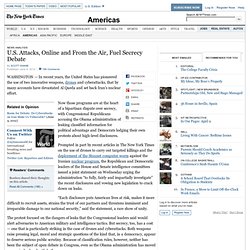
Prompted in part by recent articles in The New York Times on the use of drones to carry out targeted killings and the deployment of the Stuxnet computer worm against the Iranian , the Republican and Democratic leaders of the House and Senate intelligence committees issued a joint statement on Wednesday urging the administration “to fully, fairly and impartially investigate” the recent disclosures and vowing new legislation to crack down on leaks. “Each disclosure puts American lives at risk, makes it more difficult to recruit assets, strains the trust of our partners and threatens imminent and irreparable damage to our national security,” said the statement, a rare show of unity. Mr. Mr. Senator John McCain of Arizona, Mr.
Why Attack When We Can't Defend? - Room for Debate. Ralph Langner is a computer security expert in Hamburg, Germany, who was among the first to decode the Stuxnet computer virus that was used against Iranian nuclear facilities.
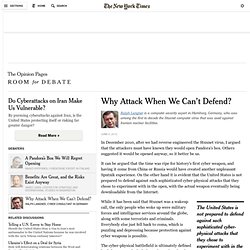
In December 2010, after we had reverse engineered the Stuxnet virus, I argued that the attackers must have known they would open Pandora's box. Others suggested it would be opened anyway, so it better be us. It can be argued that the time was ripe for history's first cyber weapon, and having it come from China or Russia would have created another unpleasant Sputnik experience. On the other hand it is evident that the United States is not prepared to defend against such sophisticated cyber-physical attacks that they chose to experiment with in the open, with the actual weapon eventually being downloadable from the Internet. The United States is not prepared to defend against such sophisticated cyber-physical attacks that they chose to experiment with in the open. Benefits Are Great, and the Risks Exist Anyway - Room for Debate. Do U.S. cyberattacks on Iran protect us or endanger us?

We could better ask if having a downed pilot paraded through the streets of Tehran is preferable to cyberattack, or whether it is better to risk the losses that would accompany the series of attacks needed to destroy well-defended nuclear facilities. With Stuxnet, there are no television shots of burning buildings, weeping victims or tortured pilots. The politics of cyberattack as an alternative are compelling, although the attacks themselves lack the destructiveness of their kinetic brethren. With cyber attacks, there are no television shots of burning buildings, weeping victims or tortured pilots. The risks of Iran retaliating are not increased. Nor do cyberattacks against Iran increase the risk of damaging cyberattacks against the United States.
We could ask whether the United States creates more problems for itself when it makes public a new weapon while potential opponents keep it secret. A Pandora's Box We Will Regret Opening - Room for Debate. If somebody would have told me five years ago that by 2012 it would be commonplace for countries to launch cyberattacks against each other, I would not have believed it.

If somebody would have told me that a Western government would be using cybersabotage to attack the nuclear program of another government, I would have thought that's a Hollywood movie plot. Yet, that's exactly what's happening, for real. Cyberattacks have several advantages over traditional espionage or sabotage. Cyber attacks are effective, cheap and deniable. Cyber search engine exposes vulnerabilities. He called his fledgling search engine Shodan, and in late 2009 he began asking friends to try it out.
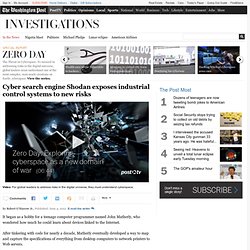
He had no inkling it was about to alter the balance of security in cyberspace. “I just thought it was cool,” said Matherly, now 28. Matherly and other Shodan users quickly realized they were revealing an astonishing fact: Uncounted numbers of industrial control computers, the systems that automate such things as water plants and power grids, were linked in, and in some cases they were wide open to exploitation by even moderately talented hackers. Control computers were built to run behind the safety of brick walls. But such security is rapidly eroded by links to the Internet.
Understanding cyberspace is key to defending against digital attacks. At just 5 ounces and 4 1/2 inches long, the iPhone is an elegant computing powerhouse.
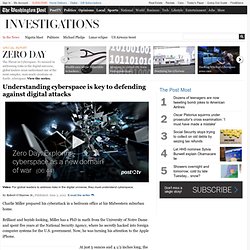
Its microscopic transistors and millions of lines of code enable owners to make calls, send e-mail, take photos, listen to music, play games and conduct business, almost simultaneously. Nearly 200 million iPhones have been sold around the world. The idea of a former cyberwarrior using his talents to hack a wildly popular consumer device might seem like a lark. But his campaign, aimed at winning a little-known hacker contest last year, points to a paradox of our digital age. The same code that unleashed a communications revolution has also created profound vulnerabilities for societies that depend on code for national security and economic survival.
Miller’s iPhone offensive showed how anything connected to networks these days can be a target. He began by connecting his computer to another laptop holding the same software used by the iPhone. Cyberweapon Warning From Kaspersky, a Computer Security Expert. He also recognized that the virus, which he compares to the virus built by programmers employed by the United States and Israel, adds weight to his warnings of the grave dangers posed by governments that manufacture and release viruses on the Internet.
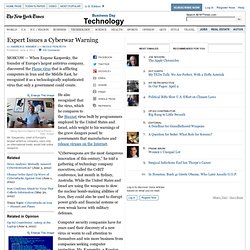
“Cyberweapons are the most dangerous innovation of this century,” he told a gathering of technology company executives, called the CeBIT conference, last month in Sydney, Australia. While the United States and Israel are using the weapons to slow the nuclear bomb-making abilities of Iran, they could also be used to disrupt power grids and financial systems or even wreak havoc with military defenses. Computer security companies have for years used their discovery of a new virus or worm to call attention to themselves and win more business from companies seeking computer protection. Mr. Kaspersky, a Russian computer security expert, and his company, Kaspersky Lab, are no different in that regard. Mr.